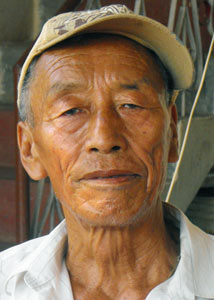Name: Lobsang Tenpa
(Alias: Yes)
Gender: Male
Interview Age: 71
Date of Birth: 1939
Birthplace: N/A
Year Left Tibet: 1959
Profession: Monk
Monk/Nun: Previously
Political Prisoner: No

Interview No.: 68M
Date: 2010-04-05
Language: Tibetan
Location: Doeguling Settlement, Mundgod, Karnataka, India
Categories: Resistance and Revolution
Keywords: Chinese army -- invasion by , Chushi Gangdrug guerrillas, escape experiences, March 10th Uprising, monastic life, resistance fighters, Utsang
Summary:
Lobsang Tenpa is from a village very close to Lhasa. His parents admitted him as a monk in Gaden Monastery at the age of 13 to prevent him from being sent to school in China. Earlier to that he passed his time grazing goats and sheep. Lobsang Tenpa was very happy to become a monk and stayed at the monastery until age 20.
Lobsang Tenpa shares how his life at the monastery came to an abrupt end in 1959 due to the unrest in Lhasa. He describes in detail how the monks from the three great monasteries of Sera, Drepung and Gaden were given weapons by the Tibetan Government to protect their monasteries from Chinese attack. Lobsang Tenpa recounts the difficulties they faced while going to the Potala Palace to get the guns and the very tense situation in Lhasa on March 10, 1959.
After a brief training on how to use the guns, Lobsang Tenpa and his fellow monks were delayed in returning to Gaden Monastery and could not do anything to protect it because the Chinese had overtaken Lhasa by then. They fled to join the resistant group, Chushi Gangdrug [Defend Tibet Volunteer Force], and Lobsang Tenpa describes his experiences with the Chushi Gangdrug guerrillas and an encounter with Chinese troops. The might of the Chinese army forced them to flee to India arriving in Mon Tawang, where they had to beg for food.
Interview Team:
- Rebecca Novick (Interviewer)
- Ronny Novick (Videographer)
- Namgyal Tsering (Interpreter)

